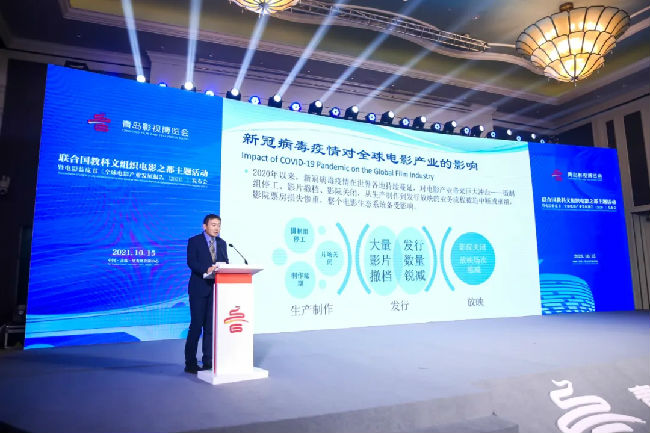On October 15, the UNESCO Film Capital theme event was held in Qingdao Oriental Movie Metropolis, Qingdao West Coast New District. The "Film Blue Book: Global Film Industry Development Report (2021)" (hereinafter referred to as the "Film Blue Book") was officially released in North America. , Asia-Pacific, Europe, Middle East, Africa and Latin America are the research horizons, which comprehensively portray the three-dimensional picture of global film development under the epidemic.

As a professional development report for the film industry, the "Movie Blue Book" was first published in 2018, filling the gaps in the global film industry research field. In September 2020, the first English version of "Movie Blue Book" was published and officially entered the international stage.
The movie blue book released this time is the fourth in the "Movie Blue Book" series. It is jointly released by Qingdao Film Academy, Beijing Film Academy National Film Think Tank, Qingdao Film Capital Office and Social Science Literature Publishing House. It adopts the theoretical research of industrial economics. The framework, based on authoritative global film industry big data and professional theoretical perspectives, conducts an in-depth and thorough analysis of the overall and subdivided sectors and hot issues of the global film industry in 2020.
The book includes six parts: general report, evaluation, China, international, case studies, and special topics. It not only summarizes the current development trend of the global film industry, but also focuses on hot topics such as the "film capital" and super IP. Based on the film industry development research system, through empirical research, scientifically and accurately judge the development situation of the film industry under the globalization pattern.
The Blue Book pointed out that due to the epidemic, the global theater box office in 2020 was 12 billion U.S. dollars, a decrease of 71.6% compared with 2019. However, as the global new crown vaccination progresses smoothly, the epidemic is effectively controlled, and the public's movie-watching demand will be restored in an orderly manner. The film industry will continue to rebound rapidly, and the global theater box office scale is expected to return to the level of 2019 by 2025.
The epidemic has aggravated the differentiation of different global cinema markets and rewritten the new pattern of the global film industry. According to Blue Book data, in 2020, the box office of theaters in North America and Latin America will drop by more than 80%, Europe, the Middle East, and Africa will drop by 68%. The Asia-Pacific region will lose less due to effective epidemic prevention, down 66%, and China's box office ($3 billion) It surpassed North America for the first time and became the single-market box office champion of the year. Among them, four Chinese films ranked among the top 10 in the global box office.
Affected by the epidemic, streaming media distribution has become the new mainstream mode of film distribution and screening in 2020. The revenue of the digital home/mobile entertainment market accounts for 76% of the global film entertainment market revenue, becoming the growth engine of the film market, a new film ecology and the film industry The structure is gradually taking shape, and the dynamic movie window period and zero window period have become the new normal.
At the meeting, Liu Binjie, Dean of School of Journalism and Communication of Tsinghua University, Wang Limin, President of Social Sciences Literature Publishing House, Zhang Shucun, Counselor of Shandong Provincial People's Government and Chairman of China Enterprise Culture Summit, Fan Hui, Director of Foreign Exchange and Cooperation Office of Qingdao Culture and Tourism Bureau, Wang Hongmin, president of Qingdao Film Academy, delivered a speech.
Representatives from 7 "film capitals" in Bradford, Bristol, South Korea, Bitola in North Macedonia, Santos in Brazil, Thalassa and Valladolid in Spain, as well as international film, television and audiovisual exchanges The board of directors, the University of Edinburgh, the University of Edinburgh, the New York Film Academy, and other professional institutions and experts and scholars from well-known colleges and universities jointly celebrated the successful release of the Blue Book in the form of online video.

Liu Binjie pointed out that the official release and publication of the "Movie Blue Book" is an important result of the joint efforts of the film industry and the publishing industry. This year’s film industry development report focuses on the analysis of the underlying causes of the different impacts of the new crown pneumonia epidemic on different countries and regions, and discusses the survival status, development trends, and problems of the global film industry, which is important for building a new pattern of global film development and improving China’s film industry in the world. The competitiveness and the right to speak in the industrial structure have important academic value and practical significance. It is emphasized that the film industry and publishing industry is an important part of building a socialist cultural power. It is necessary to promote the high-quality development of the film industry in response to the needs of the people's lives, and accelerate the integration of culture and industry, capital, operations, and the market.
Wang Limin said that with its independence, forward-looking, originality, completeness and authority, "Movie Blue Book" has become an internationally influential film think tank, which has improved the influence and voice of Chinese scholars in the world film industry structure. As a globalized cultural industry, film is an important manifestation of the cultural diversity of the world. In the face of the severe challenges brought by the new crown epidemic to the global film market, the "Movie Blue Book" provides readers with an important reference for understanding global film development.
Zhang Shucun believes that, with the help of the location advantage of the "City of Film", the Qingdao Film Academy, which brings together domestic and foreign film research and innovation talents, and establishes an international film industry research community, will promote the prosperity and development of the local and national film and television cultural industries, and become a film and cultural power. Provide talent support, and at the same time provide richer intellectual support for the development of the film industry and the construction of the "film capital".
Fan Hui pointed out that since its first release in 2018, the "Movie Blue Book" has initially formed a relatively mature editing mechanism, research and creation team, and international exchange and cooperation model, and has become the flagship project of Qingdao's "Movie Capital". As a member of the creative city network, Qingdao should comply with the historical trend of economic globalization and the requirements of the era of win-win cooperation, and provide sufficient momentum for future sustainable development.
Wang Hongmin said that as the film university of Qingdao's "film capital", Qingdao Film Academy consciously integrates into the blood of urban development, and combines the achievements of high-end think tanks launched by many experts, scholars and industry elites at home and abroad to make "Movie Blue Book" a global film. The carrier of information exchange and industrial cooperation provides strong intellectual support for the development of Qingdao's film and television industry, and promotes Chinese films and Chinese culture to the world.
The "City of Movies" is an honorary title awarded to certain "creative cities" by UNESCO's "Creative Cities Network". In November 2017, Qingdao was awarded the title of "Movie City", becoming the 9th UNESCO Creative City Network and the first "Movie City" in China.
In May of this year, with the approval of the Ministry of Education, the School of Modern Creative Media of Beijing Film Academy was successfully transferred to Qingdao Film Academy, becoming the only film college in China except Beijing Film Academy and the only "film capital" in China. The Film University provides academic research, data support and think tank services to promote the development of the film industry and the construction of the "film capital" to cultivate specialized talents in the application-oriented film and television culture industry.